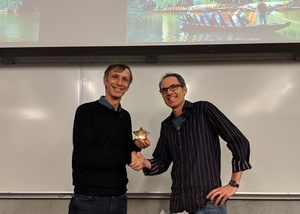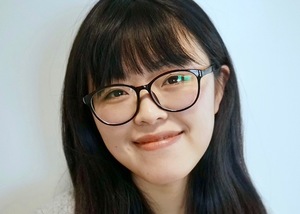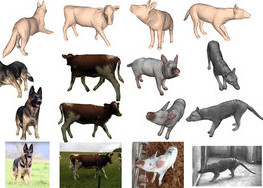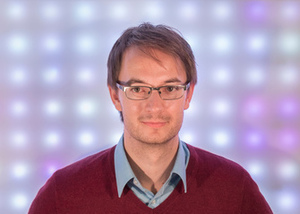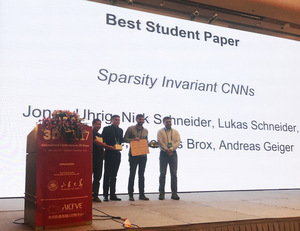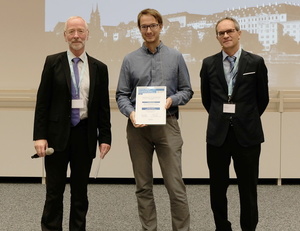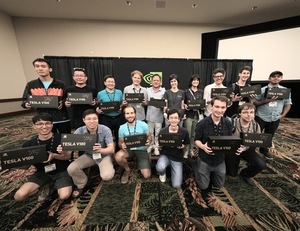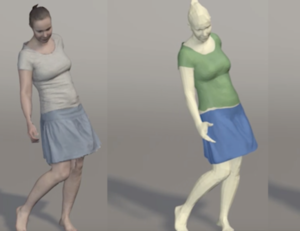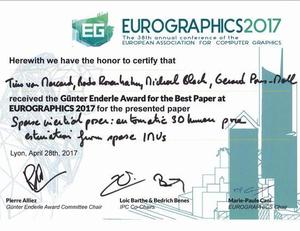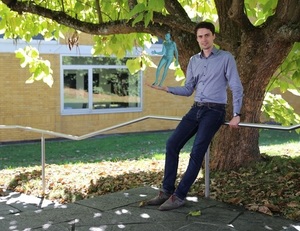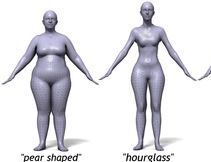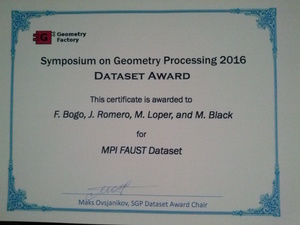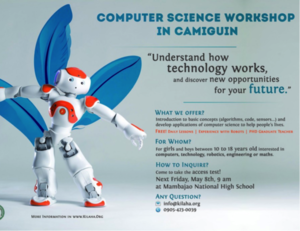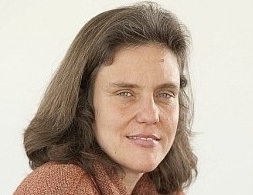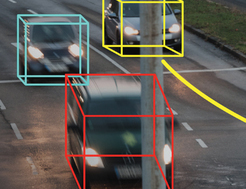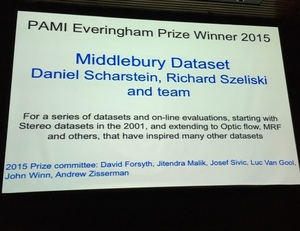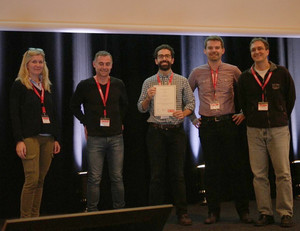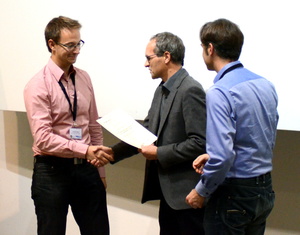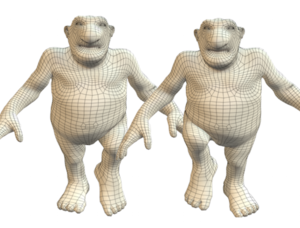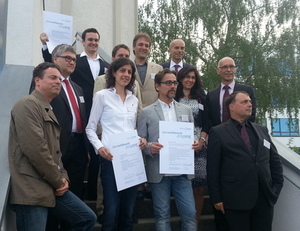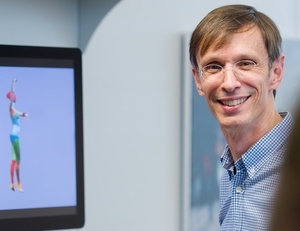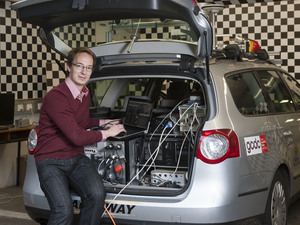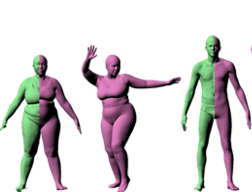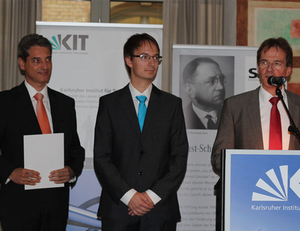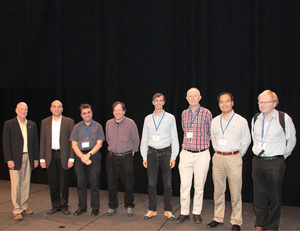News & Awards
Perceiving Systems
News
29-11-2018
Michael Black receives UBC Computer Science Department Alumni Research Award 2018
Michael Black was awarded the University of British Columbia, Computer Science Department, Alumni Research Award 2018.
Michael Black
Perceiving Systems
News
11-10-2018
Siyu Tang receives DAGM MVTec 2018 Dissertation Award
The German Association for Pattern Recognition praises her work to be “outstanding”
Tübingen – Dr. Siyu Tang received the DAGM MVTec 2018 Dissertation Award at the German Conference on Pattern Recognition (GCPR) conference in Stuttgart today. Her thesis with the title “People Detection and Tracking in Crowded Scenes” was praised by the board and the technical committee of the DAGM (Deutsche Arbeitsgemeinschaft für Mustererkennung) to be outstanding. “There was quite some competition this year”, said Reinhard Koch, the President of DAGM, which can be translated as German Association for Pattern Recognition. “This year we even decided to double the award money and grant two first places. Mrs. Tang will receive one of both. Congratulations for this achievement!” The award comes with a price money of 2.500 Euro and was given during the DAGM Award ceremony on Wednesday afternoon.
Siyu Tang
Perceiving Systems
News
10-10-2018
Body perception research using virtual reality – is this avatar really me?
How do we perceive our own body weight? Which body weight do we find attractive?
An interdisciplinary team of scientists from the Max Planck Institute for Biological Cybernetics, the University of Tübingen and the Max Planck Institute for Intelligent Systems place test persons in front of their virtual selves and examine their self-perception. The aim of the studies is to investigate how accurately healthy women and men, incl. patients with anorexia nervosa, perceive their own body weight. The findings provide insights for new therapy approaches for people with eating disorders.
Michael Black
Anne Thaler
Simone Behrens
Perceiving Systems
News
20-06-2018
Realistic Avatars for the Virtual Zoo
On the basis of a few photos alone, a new technique creates realistic avatars of animals that look and move like real animals
Filmmakers and developers of computer games will have a new way of animating animals in the future. A team led by researchers at the Max Planck Institute for Intelligent Systems in Tübingen, Germany, has developed a technique that uses photographs alone to create lifelike 3D models of almost all quadrupeds. These avatars can be animated to realistically imitate the movements of animals. But the simple method of bringing animals to life on the computer is not only interesting for the entertainment industry.
Many people have lost a beloved family pet. Now this technology can bring them back to “life” as a virtual 3D avatar. It could also benefit biologists in species protection and help to make children in particular aware of the importance of biodiversity.
Michael Black
Silvia Zuffi
Angjoo Kanazawa
Perceiving Systems
Award
24-03-2018
Best Poster Award, Deutsche Gesellschaft für Essstörungen (DGESS), 2018, Körper Sprache: Sprachliche Repräsentation von Körpern bei Patientinnen und Patienten mit Essstörungen, by Walder L., Quiros-Ramirez M.A., Mohler B., Black M.J., Keizer A., Zipfel S., Giel K., Mölbert S.
Autonomous Vision
Perceiving Systems
News
01-03-2018
Andreas Geiger zum ordentlichen Professor an der Universität Tübingen berufen
Am 1. März begann Geiger die Professur für "Learning-based Computer Vision" an der über 500 Jahre alten, renommierten Universität Tübingen. Geiger leitet weiterhin eine Forschungsgruppe am MPI-IS in Tübingen.
Andreas Geiger
Perceiving Systems
Autonomous Vision
News
12-10-2017
Best student paper award at 3DV 2017
Best student paper award at the International Conference on 3D Vision (3D 2017) for the paper "Sparsity Invariant CNNs" for Andreas Geiger and collaborators from Daimler R&D and Freiburg University.
Andreas Geiger
Perceiving Systems
Autonomous Vision
News
12-09-2017
Andreas Geiger wins German Pattern Recognition Award 2017
The German Pattern Recognition Award is awarded once a year to one young researcher in computer vision, pattern recognition or machine learning at an age of 35 years or less and sponsored by the Daimler AG with 5000€.
Andreas Geiger
Perceiving Systems
Autonomous Vision
News
22-08-2017
NVIDIA CEO presenting the brand new Tesla V100 GPUs at CVPR.
NVIDIA CEO Jensen Huang presented the NVAIL AI Labs with the very first Tesla V100 GPUs, based on NVIDIA's Volta architecture. MPI-IS is among the top centers working at the leading edge of deep learning in computer vision. As such it is recognized by NVIDIA as one of its NVAIL labs and giving the MPI access to the best and latest NVIDIA technology. Huang unveiled these new GPUs at CVPR saying that he wants to put them in the hands of researchers first.
Michael Black
Andreas Geiger
Perceiving Systems
News
01-08-2017
4D Movies Capture People in Clothing, Creating Realistic Virtual Try-on
Researchers at the Max Planck Institute for Intelligent Systems (MPI-IS) have developed technology to digitally capture clothing on moving people, turn it into a 3D digital form, and dress virtual avatars with it. This new technology makes virtual clothing try-on practical.
Gerard Pons-Moll
Sergi Pujades
Michael Black
Perceiving Systems
News
28-04-2017
Günter Enderle Best Paper Award
at Eurographics 2017
for the paper "Sparse Inertial Pose: Automatic 3D Human Motion Capture from Sparse IMUs"
Gerard Pons-Moll
Michael Black
Perceiving Systems
News
05-10-2016
Christoph Lassner in portrait
#thatsmyscience
Bernstein Center for Computational Neuroscience (University of Tuebingen), Max Planck Institute for Intelligent Systems
Christoph Lassner
Perceiving Systems
Award
12-09-2016
Highly cited article: "A Quantitative Analysis of Current Practices in Optical Flow Estimation and the Principles Behind Them" by Deqing Sun, Stefan Roth, and Michael Black, is cited by Thompson Reuters as one of three highly cited articles published in the Int. J. of Computer Vision (IJCV) since 2014.
Perceiving Systems
News
26-07-2016
Body Talk: A New Crowdshaping Technology Uses Words to Create Accurate 3D Body Models
A breakthrough in our shared understanding, perception, and description
of human body shape brings new alternatives to 3D body scanning
ANAHEIM, CALIFORNIA -- JULY 26, 2016 -- Researchers from the Max Planck Institute for Intelligent Systems and the University of Texas at Dallas, revealed new crowdshaping technology at SIGGRAPH 2016 that creates accurate 3D body models from 2D photos using crowdsourced linguistic descriptions of body shape. The Body Talk system takes a single photo and produces 3D body shapes that look like the person and are accurate enough to size clothing. It does this using the help of 15 volunteers who rate the body shape in the photo using 30 words or fewer. The researchers believe this technology has applications in online shopping, gaming, virtual reality and healthcare.
Michael Black
Stephan Streuber
Maria Alejandra Quiros-Ramirez
Silvia Zuffi
Perceiving Systems
News
24-06-2016
FAUST dataset wins the "Dataset Award" at the Eurographics Symposium on Geometry Processing 2016
The FAUST dataset wins the "Dataset Award" at the Eurographics Symposium on Geometry Processing 2016. The award encourages and recognises the importance of the distribution of high-quality datasets on which geometry processing algorithms are tested.
Federica Bogo
Javier Romero
Matthew Loper
Michael Black
Perceiving Systems
Award
24-06-2016
The FAUST dataset was awarded the "Dataset Award" at the Eurographics Symposium on Geometry Processing 2016. The award encourages and recognises the importance of the distribution of high-quality datasets on which geometry processing algorithms are tested. The creators of the dataset are Federica Bogo, Javier Romero, Matthew Loper, and Michael Black. The work originally appeared in the IEEE Conf. on Computer Vision and Pattern Recognition (CVPR) 2014.
Perceiving Systems
News
30-05-2016
A special kind of robot workshop (a nice story from last year)
A Nao flies East and helps Laura Sevilla to teach technology knowledge to children from the Philippines
Fascinated Kids with excited faces and curious voices, expressing happiness and thankfulness...- these emotions were raised by a little NAO robot that was the main actor of a robot workshop that took place in May 2015 in the Philippines. Laura Sevilla, a PostDoc at the MPI for Intelligent Systems in Tübingen, took two months off and volunteered more than five weeks in order to organize and lead this workshop.
Laura Sevilla
Perceiving Systems
News
13-05-2016
Michael J. Black Inducted as Foreign Member of Royal Swedish Academy of Sciences
Dr. Black recognized for his leadership in advancing body modeling and computer vision sciences
Body Labs (bodylabs.com), the provider of the world's most advanced technology for analyzing the human body's shape, pose and motion, announced today that Michael J. Black, Body Labs co-founder and board member, will be inducted as a foreign member of the Royal Swedish Academy of Sciences.
Michael Black
Perceiving Systems
News
19-02-2016
Cordelia Schmid receives the Humboldt Research Award
Cordelia Schmid, an Inria research director, has received the Humboldt Research Award for her work on computer vision spanning more than 20 years.
She was nominated for this scientific award by Michael Black, the director of the Perceiving Systems department at the Max Planck Institute for Intelligent Systems in Tübingen, Germany.
As the director of the LEAR team and then the Thoth team since 1 January 2016, Cordelia Schmid is particularly interested in visual recognition linking invariant image descriptors with learning methods. Her research enables a computer to learn not only to interpret all types of real images and videos, but also to recognize objects, actions and places by learning large image and video bases containing more than 100 million images.
Cordelia Schmid figures among the world’s precursors and leaders in the field of modern visual recognition methods; she is also named in the “Highly Cited Researchers 2015” list (source: Thomson Reuters).
Michael Black
Perceiving Systems
Autonomous Vision
News
07-01-2016
Autos gehen die Augen auf - Cars open their Eyes
Perception is essential for Intelligence
Einen Wagen mit Chauffeur könnte es irgendwann für jeden geben, wenn nämlich ein Roboter das Steuer übernimmt. Damit Autos auch ohne großen technischen Aufwand autonom fahren können, müssen Computer unübersichtliche Verkehrssituation jedoch mindestens genauso gut beurteilen wie der Mensch.
Andreas Geiger
Michael Black
Joel Janai
Osman Ulusoy
Perceiving Systems
News
16-12-2015
Middlebury Dataset awarded 2015 IEEE Mark Everingham Prize
The 2015 PAMI Mark Everingham Prize was awarded to the Middlebury Dataset (Daniel Scharstein, Richard Szeliski, and team) for a series of datasets and on-line evaluations, starting with the Stereo datasets in 2001, and extending to Optical Flow, MRF and others, which have inspired many other datasets. Michael Black was part of the team behind the Optical Flow dataset and evaluation.
Michael Black
Perceiving Systems
Autonomous Vision
News
22-10-2015
Ali Osman Ulusoy, Andreas Geiger and Michael Black receive 3DV 2015 Best Paper Award
Ali Osman Ulusoy, Andreas Geiger and Michael Black receive the Best Paper Award at this years 3D Vision Conference for their paper "Towards Probabilistic Volumetric Reconstruction using Ray Potentials".
Osman Ulusoy
Andreas Geiger
Michael Black
Perceiving Systems
Autonomous Vision
News
09-10-2015
Andreas Geiger and Chaohui Wang receive GCPR 2015 Best Paper Award
Andreas Geiger receiving the GCPR 2015 Best Paper Award from Reinhard Koch (president of DAGM) and Bastian Leibe (general chair of GCPR 2015) for their paper "Joint 3D Object and Layout Inference from a single RGB-D Image".
Andreas Geiger
Chaohui Wang
Perceiving Systems
News
11-08-2015
4D Movies Capture Every Jiggle, Creating Realistic Digital Avatars
Researchers at the Max Planck Institute for Intelligent Systems unveil the world’s first high-resolution 4D body scanner and software to model detailed soft-tissue motion.
Everybody jiggles” according Dr. Michael Black, Director at the Max Planck Institute for Intelligent Systems (MPI-IS) in Tübingen, Germany. We may not like it, but how we jiggle says a lot about who we are. Our soft tissue (otherwise known as fat and muscle) deforms, wobbles, waves, and bounces as we move. These motions may provide clues about our risk for cardiovascular disease and diabetes. They also make us look real. Digital characters either lack natural soft-tissue motion or require time-consuming animation to make them believable. Now researchers at MPI-IS have captured people and how they jiggle in exacting detail and have created realistic 3D avatars that bring natural body motions to digital characters.
Michael Black
Gerard Pons-Moll
Javier Romero
Naureen Mahmood
Perceiving Systems
News
10-07-2015
Third prize in the "Science2Start" Competition
The Science2Start programme is geared towards scientists interested in founding start-ups and helps putting their business ideas in the field of life sciences into practice.
Detection of new or rapidly evolving melanocytic lesions is crucial for early diagnosis and treatment of melanoma.
Federica Bogo
Perceiving Systems
News
15-06-2015
Michael J. Black elected as foreign member of the Royal Swedish Academy of Sciences
Three new members elected to the Academy
Michael Black
Perceiving Systems
Autonomous Vision
News
10-02-2015
Outstanding Doctorate Thesis within the KIT Research Field "Systems and Processes"
Andreas Geiger has been awarded the KIT Doctoral Award
In his PhD thesis, Andreas Geiger has developed algorithms for 3D scene perception in autonomous vehicles which can help to improve traffic safety, reduce traffic jams and enable car rides for elderly or visually impaired people. His approach combines visual recognition using stereo cameras with probabilistic models which are able to determine the location and orientation of roads, lanes and other traffic participants.
Andreas Geiger
Perceiving Systems
News
08-12-2014
Tiny motions bring digital doubles to life
Researchers at the Max Planck Institute for Intelligent Systems unveil new technology for motion and shape capture
The new technology (MoSh) will help animators jump the “Uncanny Valley” by turning a few moving dots into detailed body shapes that jiggle and deform like real humans. Researchers at the Max Planck Institute for Intelligent Systems in Tübingen, presented their Motion and Shape Capture (MoSh) study, which appeared in the journal ACM Transactions on Graphics, at SIGGRAPH Asia in Shenzhen on December 6, 2014. Devised by a team of researchers under the direction of Michael J. Black, Director of the Perceiving Systems department, MoSh is a method that allows animators to record the three-dimensional (3D) motion and shape of a real human and digitally “retarget” it to a new body shape. With MoSh, realistic virtual humans can populate games, the Internet, and virtual reality, while reducing animation costs for the special effects industry.
Michael Black
Perceiving Systems
Autonomous Vision
News
28-11-2014
Andreas Geiger´s PhD thesis is awarded prize by KIT mobility center
KIT-Zentrum für Mobilitätssysteme zeichnet Doktorarbeit von Andreas Geiger aus
Für ein autonomes Fahrzeug bedeutet eine innerstädtische Kreuzung mit mehreren Verkehrsteilnehmern eine große Herausforderung. Wie komplexe Verkehrssituationen mithilfe von Videosequenzen besser verstanden werden können, hat Dr. Andreas Geiger in seiner Doktorarbeit gezeigt. Dafür hat er am 27. November 2014 vom KIT-Zentrum für Mobilitätssysteme den Ernst-Schoemperlen-Preis verliehen bekommen.
Andreas Geiger
Perceiving Systems
News
01-12-2013
Michael Black awarded 2013 Helmholtz Prize
2013 Helmholtz Prize honors Michael J. Black's work on robust optical flow estimation described in the ICCV 1993 paper with P. Anandan on "A framework for the robust estimation of optical flow."
Michael Black
